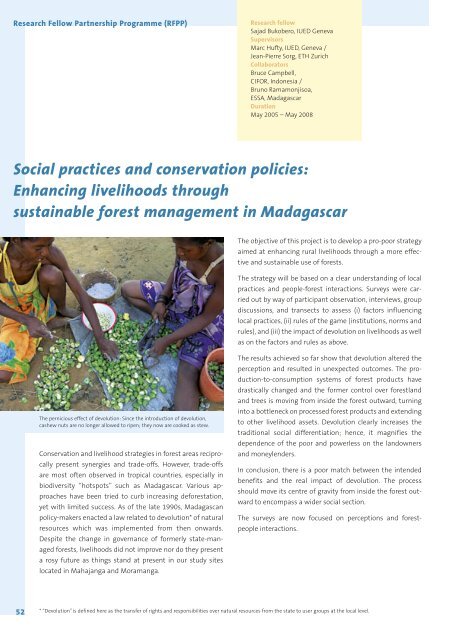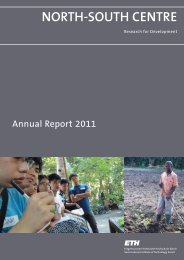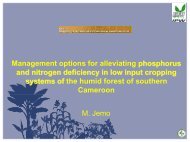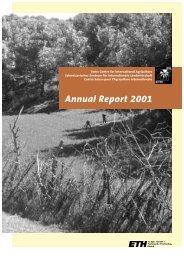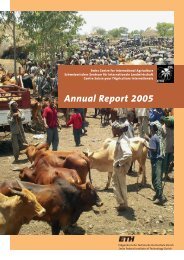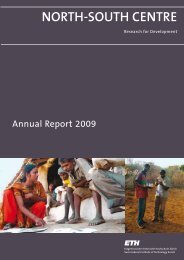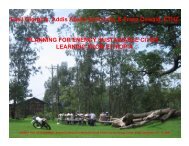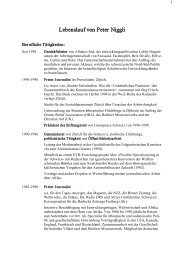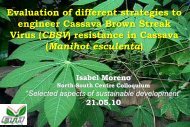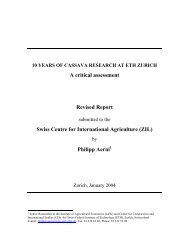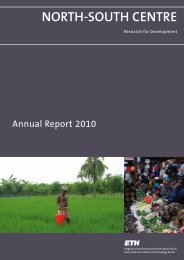Annual Report 2006/07 - ETH - North-South Centre North-South ...
Annual Report 2006/07 - ETH - North-South Centre North-South ...
Annual Report 2006/07 - ETH - North-South Centre North-South ...
You also want an ePaper? Increase the reach of your titles
YUMPU automatically turns print PDFs into web optimized ePapers that Google loves.
Research Fellow Partnership Programme (RFPP)Research fellowSajad Bukobero, IUED GenevaSupervisorsMarc Hufty, IUED, Geneva /Jean-Pierre Sorg, <strong>ETH</strong> ZurichCollaboratorsBruce Campbell,CIFOR, Indonesia /Bruno Ramamonjisoa,ESSA, MadagascarDurationMay 2005 – May 2008Social practices and conservation policies:Enhancing livelihoods throughsustainable forest management in MadagascarThe objective of this project is to develop a pro-poor strategyaimed at enhancing rural livelihoods through a more effectiveand sustainable use of forests.The strategy will be based on a clear understanding of localpractices and people-forest interactions. Surveys were carriedout by way of participant observation, interviews, groupdiscussions, and transects to assess (i) factors influencinglocal practices, (ii) rules of the game (institutions, norms andrules), and (iii) the impact of devolution on livelihoods as wellas on the factors and rules as above.The pernicious effect of devolution: Since the introduction of devolution,cashew nuts are no longer allowed to ripen; they now are cooked as stew.Conservation and livelihood strategies in forest areas reciprocallypresent synergies and trade-offs. However, trade-offsare most often observed in tropical countries, especially inbiodiversity “hotspots” such as Madagascar. Various approacheshave been tried to curb increasing deforestation,yet with limited success. As of the late 1990s, Madagascanpolicy-makers enacted a law related to devolution* of naturalresources which was implemented from then onwards.Despite the change in governance of formerly state-managedforests, livelihoods did not improve nor do they presenta rosy future as things stand at present in our study siteslocated in Mahajanga and Moramanga.The results achieved so far show that devolution altered theperception and resulted in unexpected outcomes. The production-to-consumptionsystems of forest products havedrastically changed and the former control over forestlandand trees is moving from inside the forest outward, turninginto a bottleneck on processed forest products and extendingto other livelihood assets. Devolution clearly increases thetraditional social differentiation; hence, it magnifies thedependence of the poor and powerless on the landownersand moneylenders.In conclusion, there is a poor match between the intendedbenefits and the real impact of devolution. The processshould move its centre of gravity from inside the forest outwardto encompass a wider social section.The surveys are now focused on perceptions and forestpeopleinteractions.52* “Devolution” is defined here as the transfer of rights and responsibilities over natural resources from the state to user groups at the local level.


